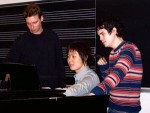Title
Juilliard’s three conducting fellows will lead members of the Juilliard Orchestra this month in a program of Brahms’s First and Fourth Symphonies. One of four offered by the conducting program each season, this concert highlights one of Juilliard’s most distinctive and perhaps least understood degree programs.
Body
Training methods for young conductors in the United States are myriad, combining European traditions with distinctly American innovations. Since his appointment four years ago as director of conducting and orchestral studies, Maestro James DePreist has enacted some imaginative changes to Juilliard’s existing program to meet the challenges of preparing the 21st-century conductor. The guiding light for the Oregon Symphony Orchestra’s rise to major status, DePreist brings to the program years of experience as a music director, guest conductor, and recording artist with major orchestras in America, Europe, and Asia. His is an alchemy of artistic idealism, professional wisdom, and down-to-earth common sense. The results are impressive, with recent graduates winning major competitions and important professional opportunities in the United States and Europe.
Our three current fellows—Joshua Tan (Singapore), Dane Lam (Australia), and Stilian Kirov (Bulgaria)—are moving through a set of challenges and opportunities, unique among American programs, that began with the audition process. Approximately 60 first-round applications are reviewed each year, which include videotapes, résumés, transcripts, and recommendations. Some 15 applicants are invited to the auditions at Juilliard. Through a two-day process, candidates take dictation and theoretical exams followed by personal interviews with Maestro DePreist. About half are then invited to conduct the Juilliard Orchestra. Only three or four students are accepted into the program at any given time. Kirov calls the audition experience “daunting but also very exciting. We were challenged to show not only our musicianship but also our philosophy and professional goals. I realize now that this was the beginning of my preparation for the professional world.”
Since their arrival, the fellows have been involved in a series of weekly seminars and projects with DePreist and other faculty. Study topics range from score analysis, performance styles, philosophy, and leadership to biographies of conductors such as Leinsdorf, Mitropoulos, and Toscanini. Juilliard’s dean and provost, Ara Guzelimian, recently led a discussion of influential conductors George Szell and Ottott Klemperer, featuring historic video footage of their rehearsals and performances. With past as prologue, the fellows are steeped in the tradition and values of that former age while staying current on the influences of contemporaries such as Simon Rattle, Alan Gilbert, and Gustavo Dudamel. Additionally, the conductors meet industry professionals each week in a class taught by music history faculty member Martin Verdrager, while Jamée Ard, Julliard’s director of national advancement and alumni relations, provides a two-day course on agents and managers. Tan says that he finds these seminars to be “incredibly important to how we start our careers, get noticed, and maintain artistic and professional perspective once we leave Juilliard.”
Perhaps the most challenging part of the program is the weekly Lab Orchestra session—the crucible in which art and craft are alloyed. In just two years, the fellows must master repertoire ranging from the Baroque to the 21st century in order to be attractive to professional orchestras as assistants, guests, and cover conductors. With this in mind, Maestro DePreist structures the sessions for both depth and breadth. There are, however, additional goals for Lab Orchestra, and the means by which repertoire is encountered is often as important as the repertoire itself. For example, one week the fellows might be required to study several works but receive only short notice about which one each will conduct. Another session might simulate an assistant conductor audition, and still another might involve intensive work on concerto accompaniment. The variety is intended to help them prepare for the challenges of their early careers, while preserving their unique qualities as artists and interpreters. Lam says, “It’s overwhelming at first, but the experience ofconducting a full orchestra is invaluable and not regularly offered in many programs. Lab Orchestra is the perfect way to hone our skills and enable us to become accustomed to the responsiveness of an orchestra. Maestro DePreist knows instinctively when to help us through a problem and when to insist we find the solution ourselves.”
One recent program innovation is the opera project held each semester. This collaboration between the Vocal Arts and Conducting Studies departments gives young conductors an opportunity to work on major operatic repertoire under the tutelage of seasoned artists, such as George Manahan and Asher Fisch. According to Brian Zeger, artistic director of vocal arts, “Too often, operatic repertoire is given short shrift in conducting training. It is wonderful to see it incorporated into their curriculum. Plus, the singers learn as much from the process as the conductors do, by gaining insight into the technical and interpretive demands an opera conductor faces.”
With such a comprehensive training program, combined with other opportunities they have through Juilliard, as well as just being in New York, these three fellows are fortunate indeed. Upon graduation, they will have already conducted a large portion of the standard repertoire, under the guidance of top artists and professionals in an environment that is both challenging and encouraging. In Maestro DePreist’s words, “The key is the selection of the ideal candidates, who can then be guided in the fullest exploration of their gestural and interpretive skills through the discovery of possibilities. They should leave armed with solidly reasoned artistic options.”





